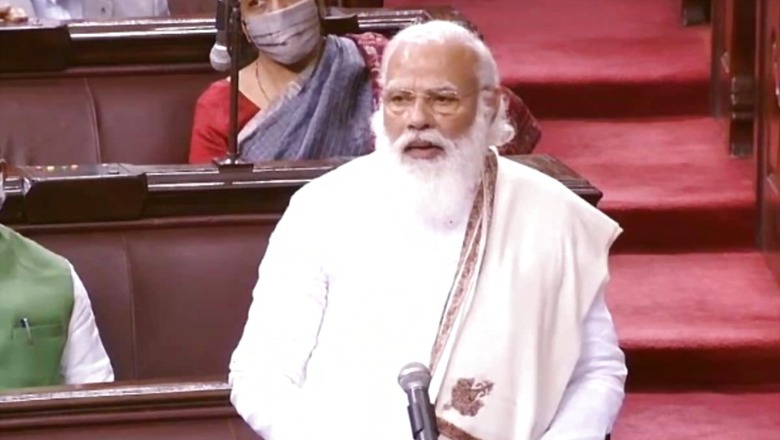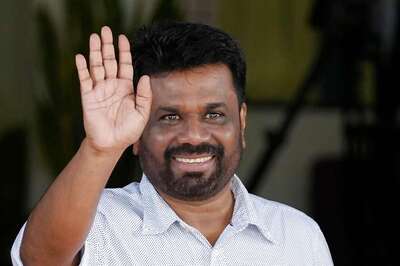
views
Bharat is going through one of the toughest times in the recent years. On one hand, we as a nation are facing the challenges of bringing the economy back; on the other hand the Opposition and a nexus of radical elements have joined hands to promote confrontationist politics in the garb of opposing the recently enacted farm laws.
On Monday, while replying to the debate on the President’s address in the Rajya Sabha, Prime Minister Narendra Modi brought this issue to the fore too, quite forcefully when he coined a new term for such ‘professional protesters/confrontationists’ as ‘Andolanwadi’ in Hindi. He had said: “Aandolanwadi parjeevi hain” (professional protesters are parasites), and rightly so as the nation has also seen the same set of people and ideologies right from the days of the Shastri era’s Green revolution to the Narmada Bachao to CAA and now the Kisan aandolan.
The Prime Minister clearly hit his opponents the hardest where it matters them the most.
Also read: How the PM’s Speech Put the Farm Laws in Context of History and Future of India
While speaking he tried to assuage the agitating farmers about the agricultural reforms. While doing this, he also assured the House and farmers about the MSP, which happens to be the main concern. He explained at length the steps taken by his government to double the income of farmers.
The Prime Minister laid bare the ‘politics’ of farm laws as he pointed out the U-turn taken by the Opposition on the issue of agricultural reforms and even the recently enacted laws. Be it the Congress or the NCP or any other major political party, whenever they have been in the government, they always supported rather pushed for those reforms which the Modi government has enacted.
Despite what happened at the ‘Red Fort’ on January 26, the Prime Minister reached out to farmers. He urged them to end protests while renewing the government’s offer to talks. The PM has also slammed the Opposition parties for making a U-turn on the farm laws as all the past governments had supported reforms in the agriculture sector.
Most significantly, the Prime Minister underlined the fact that attempts are being made to create fault lines in Punjab on sectarian basis. His indications were clear that such attempts by vested interests need to be exposed and should not be allowed to succeed at any cost. It is clear that this government has learnt its lessons from the past and is not going to repeat the mistakes the Congress governments had committed in 1980s, resulting in grave unrest in Punjab. The ghosts of the past are being revoked by the Opposition, which is unfortunate not only in the context of electoral politics but also in the context of national interest.
Also read: Ghulam Nabi Azad Struggles to Hold Back Tears in RS as He Recounts 2007 Militant Attack in Farewell Speech
On India’s Covid-19 fight, the Prime Minister’s stand of appreciating the combined efforts of the Centre and the State governments, cutting across political lines, was significant. The PM was clearly indicating that his government has an all-inclusive and consensual approach in stark contrast to the confrontationist politics of the Opposition.
The Prime Minister also underlined the fact that India has taken a lead in global efforts to fight this pandemic through its pharmaceutical sector’s efforts as India is not only vaccinating its own people at the fastest pace in the world but also providing these vaccines to any other country that wants it. Its neighbouring nations as well as many other countries have already received millions of free doses from India.
The biggest success story of the Modi government till now surely is the way it fought Covid-19 pandemic. As compared to the rest of the world, India has done much better and has emerged as a role model notwithstanding the fact that it has more than 1.3 billion population and limited resources.
The conclusion is clear that if a government has the right intent and the will to execute it, adversities can be turned into opportunities. This is what India has done and the credit to a large extent goes to the Modi government that is now known for leading from the front on every issue.
Addressing the issue of a conspiracy to malign India through various foreign fuelled protests and agitations, the Prime Minister invoked Netaji Subhash Chandra Bose, the “first prime minister of Azad Hind Fauz”, while defining Indian nationalism. It is not narrow, it is also not aggressive and it is not selfish. In fact, it is inspired by the age-old guiding spirit of ‘Satyam Shivam Sundram’.
Countering the propaganda that democratic values are under attack during the Modi government’s regime, he pointed out that India is the mother of democracies. The indication was clear, representatives of fringe groups and authoritarian states, publicity hungry celebrities or social media influencers and representatives of democracies, which are appearing to be broken already, need to learn from India and it isn’t the other way round.
In a nutshell, the PM has clearly given an indication that he is acting more like a statesman who is trying to bridge all those gaps cutting across political lines which need to be filled so that the politics of confrontation should be replaced by the polity of inclusiveness, growth and prosperity.
(The writer is a member of Delhi state RSS executive. Views expressed are personal)
Read all the Latest News, Breaking News and Coronavirus News here




















Comments
0 comment